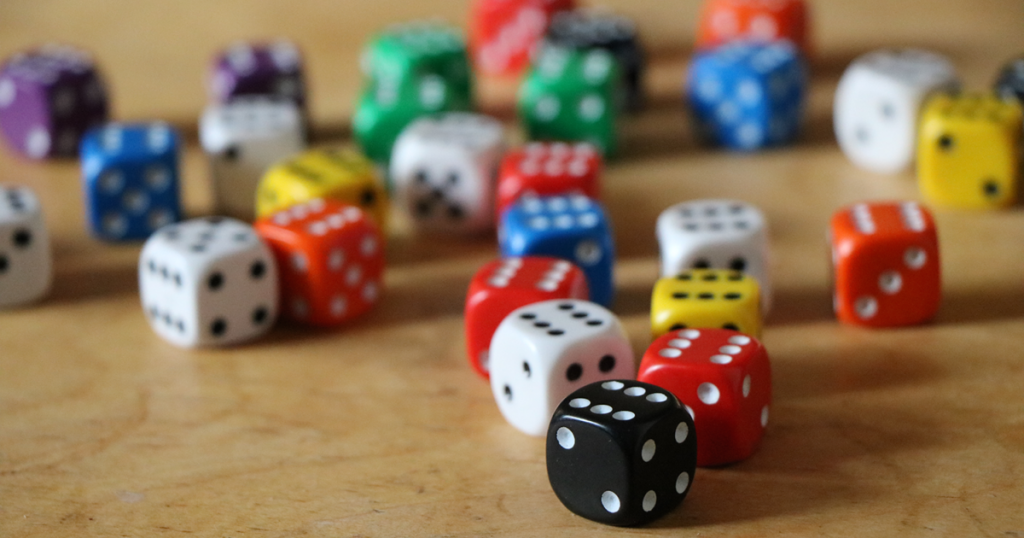I’d like to introduce you to an idea I have been toying with that could, in theory, be used to shape player behaviour in and out of the game – the idea of player karma. “Player karma” is a system that can run on top of almost any other Table Top RPG system that has a single GM, DM, or Narrator in charge.
Why would you need Player Karma (PK)?
Before we look into what exactly player karma is, we should know why we need it.
Player Karma is training wheels for groups that feature new or easily distracted players. PK is something a GM can say they are using (even if they are not) when they want to be clear that they are only interested in running a game for people who want to be there.
Dealing with “poor” players
Good RP is easy to reward. Some extra gold and a little bonus XP and the player should feel suitably rewarded. But, in some games, you may find that one or two players slow the game down.
Maybe they are a bit too prone to browsing Facebook while other players are taking a turn in combat. Maybe they are more interested in discussing the next seven feats they have planned out than dealing with the goblins in front of them. Or maybe they just refuse to take their chosen alignment seriously. For example, a Paladin played by someone randomly doing mean and evil things because that seems like it would be “more fun”.
There are a lot of little things players can do which stagnate and spoil a game. As one-off moments, they are no big deal. We all have “off” moments. However, if these off moments are happening too often, it is time to make that crap have in-game consequences.
The whole PK idea came up as I considered what the ultimate Evil GM would do to player characters whose players were too busy gossiping about what they watched on TV last night. Rocks would probably fall; people would probably die. Satisfying as that might be, it would not be much fun and would almost certainly result in hurt feelings. RPG games are about fun not crushing beloved characters.

A fun answer to reward good play
I wanted instead, something that would be fun but would keep the players guessing. Something that would make bad luck and good luck become something that my players obsessed over endlessly. That was where I came up with the idea that I could tell my players that I was tracking (with points) good and bad play. When it came to edge cases and near misses (or near hits) those points could, maybe, sometimes, tip the balance. You will never know for sure but good players have luckier characters.
The goblin fruitlessly hitting you with that stick suddenly crits. You take damage and are knocked prone. It could be that the “gods of the dice” just did not favour you at that moment. On the other hand, it could be that the GM had some of your negative Karma points he chose to spend.
Should I, as a player, have been trying harder to bring my character to life? Have I been joining in the game or have I been going off to make drinks during my turn? Hmm… I think I have been doing okay so maybe that was just bad luck. Just to be on the safe side, I should probably be on the lookout for a good RP moment. Maybe I should get around to writing down my character back story for the GM?
Player Karma is, therefore, a carrot and a stick to reward good behaviour and “punish” less desirable behaviour. It will always arrive in the form of story moments and players will have to guess when it and if it has happened.

How does Player Karma (PK) work?
How PK works
Player Karma is a tool for GMs to use. You use it to simply track the balance of good and poor engagement. What earns a player +1 or -1 on the secret stat is entirely up to you. Whatever those things are, if the players know about them they will be more mindful about avoiding or doing those things.
Tracking Player Karma
Mechanically, Player Karma is a very simple concept. As the one running the game the GM simply keeps track of a single number. This number starts at 0.
When the players do things that you think count as “good play” – RPing instead of dice rolling, bringing their character to life, interacting with the group in character, contributing to the session, supporting each other, etc. etc. – those things earn a +1 (or sometimes +2). I would almost certainly reward a little bonus XP in such cases just to let the players know that this is good stuff.
Anything else you want to encourage more of should likewise have a score.
On the other hand, if the player slows battle down because they were not paying attention; should they start ignoring their chosen alignment for no good reason, or anything else that spoils the game for others, well, that’s a -1. Phones out during play is a -5 each time it happens. Other infractions would be rated in accordance to your own view of negative player behaviour.
You have to tell the players about Player Karma
One more thing is needed. You have to tell the players that you are using a Player Karma system. Define for them what earns good or bad karma (but not how much). Explain what that karma can do to their characters. You should also be firm about the fact that you will not let players know if they were lucky (or unlucky) or feeling the result of their karma. Be decidedly unclear if good karma cancels out bad (it does unless you track the two separately).
That is the evil bit – random chance should now feel like it is something the player has brought on themselves.
You want the players to think of good things that happen – the dragon fumbles an attack and they live to see the next round – as something they earned through good play. Good luck moments should feel like the result of personal skill.
Likewise, you want the players to see misfortune in the game as a result of personal failure. That moment the level one commoner got the better of them at cards, for example.
In short, playing well should be like a new player religion or at least a superstition. For players that are already over the top worried about things like warming up the dice and other superstitious quirks, this should really get them right where they live.

How to apply Player Karma
There are two ways you can apply player karma to the game. As long as the players do not know which it is the results should be the same.
The not actually doing anything approach
There is no reason why you need to actually act on the karma value ever. If the players think that you are – or might be – they will still behave as if you were. Remember, GM fiat outcomes and dice roll outcomes are functionally identical if the player is none-the-wiser. As long as players think that by putting down those phones and joining in properly is better for them, that can often be enough.
The active approach
This is the way that I first envisioned Player Karma being used. In this mode, you are looking at ways to trend the PK score for each player towards zero.
Every arbitrarily mean thing that you make happen to a player should be worth a proportionate number of positive points. Likewise, any moment of generosity should be worth a few negative points. In other words, you spend the positive or negative balances with in-game actions.
When asking the player to make a save, perhaps they fail by a point or two. You check their Karma and see that they have a +12 balance. The gods have smiled on them, and either you let them “pass” or the failure results in some good fortune. For example, they fail the climb check and fall from the tree but their clothes catch on the branches and they can scramble to safety. Apply a -1 to their Karma and move on.
Treasure is another area to repay Karma. Cursed items could show up for players with negative values while really good magic items could show up for a player with a positive balance. Perhaps a player with +11 Karma might find a magic item that is +2 instead of +1 in exchange for four karma points.
Who the enemy NPCs target is another function that could be decided by Karma. Maybe the characters whose players have the worst scores just seem that bit more threatening and get hit a bit more often. Maybe this reduces negative Karma or maybe it does not. Your players will have no way of knowing.
It is up to you as a good GM to decide how and when these little moments payout. The players themselves will never know if fate adapted to repay their good play. All they know is that they did not just take fall damage and alert the guards.
The one thing Karma should never do is unbalance a game. PK should, however, make players that are contributing feel like they are just a touch luckier (sometimes).

Using Player Karma to avoid favouritism
There is a third use of Player Karma. The PK could just be used as a secret GM metric to track the number of generous and punishing moments each player has received from you. In this case, you are just looking to keep the player values about the same.
Favouritism is a huge GM taboo. In almost all cases, it is something to avoid. Nothing ruins a game group quite so fast as knowing that one player is getting special treatment.
If you want a mechanic that keeps a check on how evenly you are treating players, this could be the tool for you. The only difference is that you would keep the PK secret as it is being used to track your behaviour and not player behaviour.
When not to use Player Karma
PK is basically training wheels for a new group. It is just a way of saying that there is an ideal way to play that is maximum fun for everyone. You would like the group to aim for that maximised fun zone.
Player Karma (PK) would be a pretty terrible idea with a consistently amazing group of players. The sole purpose of PK is to keep players focused on really contributing. If the whole table is fully engaged, PK is just one more stat growing and growing that you have to track.
PK is utterly useless if you suck as a GM. Players can only be as engaged as you enable them to be. If you GMing style is hard to engage with, no amount of threats and rewards will help fix your poor GMing skills. Which is why, if you even suspect that your players might not be fully engaged because of your GMing, work on your GM style before you reach for this system.
If your players start demanding special treatment after a session where they are sure they did well, you have either made the Karma system too obvious or the players are a bit too attached to it. A quick fix could be to say that talking to the GM about karma is worth negative points but you may need to sit down and just talk to your table about what they want from the game.
At some point, the training wheels have to come off. My approach would be to just phase out the use of karma points without telling the players. Maybe I would tell them one day, maybe I will not. As GM, this too comes down to judgement and knowing your players.

Would you use Player Karma (PK) in your games?
Give me some feedback on this idea. Would you apply player Karma in a game you ran? Should excess PK carry over from one game to the next in the form of starting bonuses – wealth and stat re-rolls?
Is this a very bad idea? Is it the work of evil genius?
How would you feel if your GM was doing this? Have you (as player or GM) used a similar system before in a game?
Talk to me and let me know what you think in the comments below.

